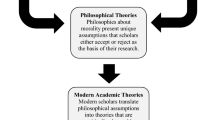Abstract
Given a reasonable coherentist view of justification in ethics, applied ethics, as here conceived of, cannot only guide us, in our practical decisions, but also provide moral understanding through explanation of our moral obligations. Furthermore, applied ethics can contribute to the growth of knowledge in ethics as such. We put moral hypotheses to crucial test in individual cases. This claim is defended against the challenges from moral intuitionism and particularism.
Similar content being viewed by others
Notes
I defend this view in (Tännsjö 2010, pp.).
There is a sense in which Jonathan Dancy accepts that there are moral principles, but this seems to me a misnomer. These ‘principles’ cannot operate as premises in any moral explanation; they are just shortlists (or eventually very long lists) of considerations that have sometimes been decisive to the normative status of some particular action, and which it may be wise to keep in mind.
In this passage I rely on my argument in (Tännsjö 1998, Chapter 2).
My use of the term ‘cognitive psychotherapy’ is inspired by Richard Brandt. I heard him presenting the idea in a talk in Stockholm in the early seventies, and he writes about it in (Brandt 1979).
References
Brandt RB (1979) A theory of the good and the right. Clarendon, Oxford
Broad CD (1930) Five types of ethical theory. Harcourt, Brace and Co, New York
Dancy J (1993) Moral reasons. Blackwell, Oxford
Feigl H (1952) In: Sellars W, Hospers J (eds) Validation and vindication reprinted in readings in ethical theory. Appleton-Century-Crofts, New York
McDowell J (1979/1989) Virtue and reason, initially published in the monist. In: Clarke G, Simpson E (ed) Anti-theory in ethics and moral conservatism, vol. 62, 1979, pp. 331–350. New York: State University of New York Press, 1989
Parfit D (1984) Reasons and persons. Clarendon, Oxford
Ross WD (1930/1973) The right and the good. Clarendon, Oxford
Tännsjö T (1998) Hedonistic utilitarianism. Edinburgh University Press, Edinburgh
Tännsjö T (2010) From reasons to norms. Springer, Dordrecht
Author information
Authors and Affiliations
Corresponding author
Additional information
This paper has grown out of a course in applied ethics I held for the ethics program at The University of Oslo in the winter of 2008. It has been presented at the higher seminar in practical philosophy at Stockholm University in the fall of 2009. It has then been presented in the conference in January 2010 on Moral Theory and Theorizing in Ethical Deliberation in Swansea. I thank my students in Oslo and the participants in the two seminars for valuable comments.
Rights and permissions
About this article
Cite this article
Tännsjö, T. Applied Ethics. A Defence. Ethic Theory Moral Prac 14, 397–406 (2011). https://doi.org/10.1007/s10677-011-9293-8
Published:
Issue Date:
DOI: https://doi.org/10.1007/s10677-011-9293-8




